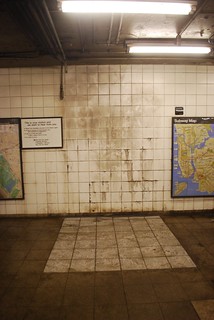
If the MTA has its way, station agents would no longer sit inside token booths but would instead serve multiple roles within their assigned stations. (Photo by Benjamin Kabak)
For years, the MTA has engaged in an aggressive move to shutter former token booths and reduce the number of full-time staff who sit in these glass cubes occasionally dispensing a MetroCard, a map or a scowl at some straphanger. Even as I’ve supported the effort, it’s still jarring to see the outline of a former booth and no personnel at the entrance to, say, the Bay Ridge-bound Union St. station on 4th Ave., and now the MTA wants to take staffing reassignments to the next logical level.
According to a report in the Daily News, in discussions with the TWU over the union’s next contract, the MTA has proposed doing away with agents in booths entirely at 25 stations and essentially reassigning these employees to serve instead as roving station assistants. It’s a workrule change that has long faced strident union opposition but would do much to make helpers in the subway far more visible while eliminating a position that serves little use these days.
Pete Donohue has the story:
Subway riders will have no choice but buy MetroCards at vending machines under a proposed pilot program that would eliminate all booth positions at 25 stations, The Daily News has learned. Instead of a clerk behind the glass, each station would have a transit worker carrying out a wider-range of duties that might include such tasks as crowd control on platforms, emptying garbage cans and waiting with an ill rider for an ambulance to arrive, according to union and management sources.
Workers in this new role would not handle cash or sell fares but they would still provide riders with travel directions and information, sources said. “The idea is an employee can do a lot more for customers outside of the booth than inside,” an MTA official said.
Metropolitan Transportation Authority brass outlined the proposal in broad terms recently during contract negotiations with Transport Workers Union Local 100, which represents bus and subway workers. An MTA spokesman declined to comment because the proposal was part of closed-door contract talks.
As Donohue notes, such a move would represent a major sea change in employee operations as currently “the MTA can’t assign a worker in one job title to duties now proscribed to another title.” The union publicly isn’t interested in this measure because it would obviously reduce staffing levels considerably. It would though lead to a cleaner subway system and a more productive workforce as the vast majority of station agent workhours are spent idle.
Where this idea goes from here is anyone’s guess. For the MTA to realize its net-zero labor projections, the TWU can either accept a shift in workrules, reductions in benefits or a smaller workforce. The union is unlikely to fight against its members’ best interests, and this proposal certainly isn’t something the rank-and-file will embrace even if it has the potential to be a big gain for riders and the MTA.
It’s a positive sign though that the MTA is even talking about this move. Since the end of the token era, station agents have had fewer and fewer responsibilities as station environments receive less and less attention. Shifting workrules to create a more productive and passenger-friendly labor force should be embraced.


 Word from Albany on Friday that, pending State Senate approval, Tom Prendergast would become
Word from Albany on Friday that, pending State Senate approval, Tom Prendergast would become 